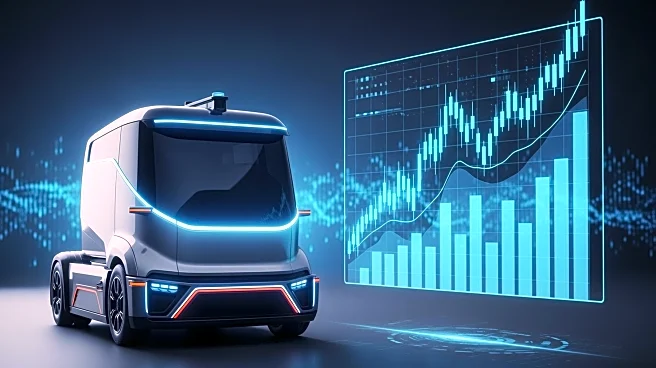What's Happening?
Einride, an autonomous electric vehicle (EV) freight trucking company, is set to go public on the New York Stock Exchange through a SPAC deal with Legato Merger Corp. III. The deal values Einride at $1.8 billion and is expected to raise $219 million in gross
proceeds, with an additional $100 million in PIPE capital from institutional investors. Einride plans to begin trading in the first half of 2026. The Stockholm-based company, founded in 2016, has a fleet of approximately 200 electric vehicles and serves over 25 customers across seven countries, including GE Appliances and Apotea. Einride aims to reduce emissions in the freight trucking industry, which it estimates to be a $4.6 trillion market.
Why It's Important?
Einride's move to go public highlights the growing interest and investment in autonomous and electric freight technology. The company's focus on reducing carbon emissions aligns with global efforts to combat climate change and improve environmental sustainability. By expanding its operations and customer base, Einride is positioned to influence the freight industry significantly, potentially leading to more widespread adoption of electric and autonomous vehicles. This development could impact U.S. industries by encouraging similar technological advancements and investments in sustainable transportation solutions.
What's Next?
As Einride prepares to go public, the company is likely to accelerate its global expansion and continue developing its technology. The successful execution of the SPAC deal could attract more investors and partners, further boosting Einride's growth. Stakeholders in the freight industry, including competitors and regulatory bodies, may respond by increasing their focus on sustainable and autonomous solutions. The company's plans to deploy 300 electric trucks across Europe by 2030 indicate a long-term commitment to expanding its operations and influence.
Beyond the Headlines
Einride's public offering could set a precedent for other companies in the autonomous and electric vehicle sectors, encouraging them to pursue similar paths to raise capital and expand their operations. The company's focus on reducing emissions and improving efficiency in freight transportation may also lead to broader discussions on regulatory changes and incentives to support sustainable practices in the industry.
















